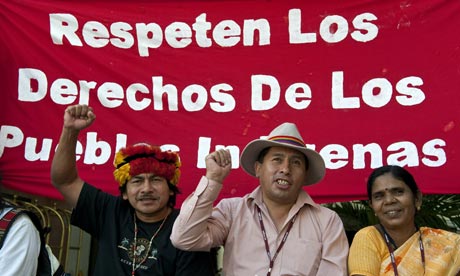Or, Why the UN is Worse than Useless and we need to Flood Wall Street!
Climate Convergence Plenary Address, Friday, 19 September 2014
Anne Petermann, Global Justice Ecology Project, Campaign to STOP Genetically Engineered Trees

UN Security arrests clown at Durban Climate COP shortly before assaulting the photographer. Photo: Photolangelle.org
Good evening everyone and thank you to Jill, Margaret and the other convergence organizers for the opportunity to speak to you tonight.
In four days time, UN Secretary General Ban Ki-moon will hold a UN Climate Summit–a closed door session where the world’s “leaders” will discuss “ambitions” for the upcoming climate conferences (or COPs as they are called) in Lima, Peru and Paris, France.
I was asked to put into context the reason for the march and actions this weekend–especially the problem of the corporate capture of the United Nations Climate Convention, which I have attended and organized around since 2004, when I attended my first UN Climate COP, in Buenos Aires, until 2011 when I was permanently banned from the UN Climate Conferences following a direct action occupation at the Climate COP in Durban, South Africa.
But I actually got involved with the UN Climate Conferences through the work I have dedicated myself to, which is stopping the dangerous genetic engineering of trees.
What happened was in 2003, the UN Climate Conference decided that GE trees could be used in carbon offset forestry plantations. Understanding that this was a potential social and ecological disaster, and being completely naïve about the UN process, we decided to go to the UN and explain to them why this was wrong, and to get them to reverse this bad decision.
But what we found out was that GE trees had been permitted in carbon offset forestry plantations because Norway had tried to get them banned. But Brazil and China were either already growing GE trees or planning to, so they blocked Norway’s proposal. As a result, GE trees were allowed simply because they could not be banned. The UN, we learned, does not reverse decisions, regardless of how ill-informed and destructive they are.
This is the dysfunction of the UN Climate Convention.
But let’s go back a minute to see how we got where we are now.




